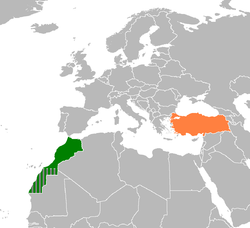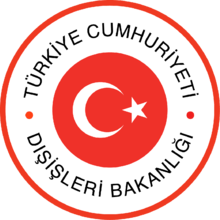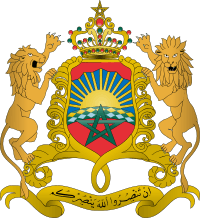Morocco–Turkey relations
 |
|
Morocco |
Turkey |
|---|---|
Turkey–Morocco relations covers relations between Morocco and Turkey, and spanned a period of several centuries, from the early 16th century to the 19th century when Northern Africa was taken over by France, until modern times.
The history between the Ottoman Empire and Morocco constitutes a strong basis for the current bilateral relations without any historical prejudices. From the Moroccan perspective, Turkey is a modern and developed country which also keeps its national identity.
Diplomatic relations between Turkey and Morocco were established on 17 April 1956 by a joint declaration of the Governments of two countries; following the proclamation of independence of the Kingdom of Morocco.
Ottoman-Morocco relations

From the early 16th century, the Ottomans had been constantly reinforcing their presence in northern Africa, starting as corsairs, from around 1500 to 1519.[1]
Ottoman occupation of Tlemcen (1517)
The brothers Hayreddin and Oruç Barbaroussa became very powerful with the Fall of Tlemcen (1517) and the Capture of Algiers (1516) and again the definitive Capture of Algiers (1529) with the help of the Ottoman Sultan after they joined the empire, they progressively ended the influence of Spain and there Zayyanid Allies. After the 1517 fall of Tlemcen, the Zayyanid Sultan of Tlemcen had already fled to Fez in Morocco to find refuge.[2]
The Ottomans had been fighting as the enemies of Catholic Spain in North Africa. At the time the Saadian dynasty was emerging in southern Morocco, which had been successful in repelling the Portuguese from southern Morocco, particularly from Agadir in 1541. The Saadians challenged the rule of the Moroccan dynasty of the Wattasids in northern Morocco, and tried to unify Morocco under their rule.[3]
Ottoman occupation of Tlemcen (1545)
The Moroccans and Ottomans started to interact closely from around 1545.[3] In June 1545, Hasan Pasha, son of Hayreddin Barbarossa and ruler of the Regency of Algiers, occupied the city of Tlemcen, where he set a Turkish garrison, and put pro-Ottoman [[Mohammed ash-Sheikh
|Sultan Muhammad]] on the throne.[3] Hassan Pasha hoped to establish an alliance with the Wattasids against the Spanish.[3] The Wattasids in turn hoped to obtain Ottoman military support against their enemies.[3]
The Saadians were the enemies of the Wattasids, but also considered the Ottomans with disdain: religiously, the Saadians were considered descendants of the Prophet, being Sherifians, whereas the Ottomans were only recent converts in comparison.[3]
Wattasid alliance with the Ottomans
Things came to a head in 1545, when the Wattassid ruler of northern Morocco Sultan Ahmad was taken prisoner by his southern rivals the sharifian Sadiyans. His successor, Ali Abu Hassun, regent for Ahmad's young son Nasir al-Qasiri, decided to pledge allegiance to the Ottomans in order to obtain their support.[3] At the same time, the Ottoman started to exert direct influence in Tlemcen from 1545, where they ousted Mansur bin Ghani, the chief of the Banu Rashid, and placed [[Mohammed ash-Sheikh |Sultan Muhammad]] on the Tlemcen throne instead.[3]
Mansur bin Ghani went to Spain with Count Alcaudete, the Governor of Oran, to obtain military support for a campaign against the Ottomans. In 1547, Spain mounted an expedition against Ottoman Mostaganem, and failed, but in the meantime Mansur captured Tlemcen from the Ottomans and put his brother Ahmad in place as ruler. Following the Spanish defeat, the Ottomans reconquered the area, and again put Sultan Mohammad on the throne of Tlemcen.[3]
In Morocco, the Ottomans were unable to intervene when the Saadians conquered Fez in 1549, and ousted pro-Ottoman regent Ali Abu Hassun. Ali Abu Hassun was nevertheless offered asylum in Algiers.[3]
1551 Moroccan offensive

As the Ottomans were set to put Ali Abu Hassun back on the throne, the Saadians set up an offensive on the Regency of Algiers in 1551.
The Saadian ruler Mohammed ash-Sheikh sent an army of 30,000 men, led by his son Muhammad al-Harran, to invade Tlemcen in 1551.[3] They took the city easily, from which the Ottoman garrison had been removed in 1547. The Saadian army continued to the Ottoman stronghold of Mostaganem, but failed to capture the city.[3] On this occasion, the Emir of the Banu, which had been an enemy of the Ottomans for 30 years, actually sided with the Ottomans against the Saadians, and provided troops.[3] The Moroccan Saadian army was repulsed by the combinaison of tribal troops and Ottoman Janissaries led by Hasan Qusru.[3] Al-Harran died of illness in Tlemcen.[3] The last Zayyanid ruler of Tlemcen, Hasan, fled to Spain, and died there a few years later.[3]
Hasan Qusru managed to conquer Tlemcen from the Moroccans, and put an Ottoman governor and garrison in place, establishing direct Ottoman rule, and putting an end to the Zayyanid dynasty that had ruled the city.[3]
Ottoman capture of Fez (1554)
In 1552 Suleiman the Magnificent attempted a diplomatic rapprochement with the Saadians, putting the blame on Hasan Pasha for the conflict, and removing him from his rule in Algiers.[3] He was replaced by Salah Rais, who nevertheless marched on Fez and occupied the city in early 1554, when the Moroccan ruler Mohammed ash-Sheikh rejected cooperation with the Ottomans. He put Ali Abu-Hassun in place as Sultan of Fez, supported by Janissaries.[4] In September 1554 however, Mohammed ash-Sheikh managed to recapture Fez, and started negotiations with Spain to oust the Ottomans.[3]
Hasan Pasha was again named beylerbey of Algiers in June 1557, in order to continue the fight against the Moroccan ruler, who had formed an alliance with the Spanish against the Ottomans.[4] He had Mohammed ash-Sheikh assassinated in October 1557.[4]
Ottoman invasion of Morocco (1558)
Hasan Pasha invaded Morocco in early 1558, but he was stopped by the Moroccans north of Fez at the Battle of Wadi al-Laban, and had to retreat upon hearing of Spanish preparations for an offensive from Oran.[4] He reembarked from the port of Khassasa in northern Morocco, and from there returned to Algiers to prepare a defense against the Spaniards.[4]
Mostaganem expedition (1558)
The Spanish attacked the Ottomans with Saadian support in the Expedition of Mostaganem (1558), but failed miserably.[4] The failure of the expedition of Mostaganem ended attempts at a grand alliance between Spain and Morocco against the common Ottoman enemy.[5]
Saadian dynastic feuds and Ottoman influence

After the murder of Mohammed ash-Sheikh by the Ottomans in 1557 and the following struggle for power, the three younger sons of Mohammed ash-Sheikh had to flee their elder brother Abdallah al-Ghalib (1557–1574), leave Morocco and stay abroad until 1576. The three exiled brothers, Abdelmoumen, Abd al-Malik and Ahmad, the latter both future Sultans of Morocco, spent 17 years in exile Istanbul, where they received Ottoman training.[6] In January 1574, while in Istanbul, Abd al-Malik was saved from an epidemic by French physician Guillaume Bérard. They later became friends due to this event. When Abd al-Malik became Sultan, he asked Henry III of France that Guillaume Bérard be appointed Consul of France in Morocco.[7]
Abd al-Malik took service with the Ottomans. In 1574, Abd al-Malik participated to the Conquest of Tunis (1574) on the side of the Ottomans.[6] He was then able to invade Morocco with the help of an Ottoman Empire force of 10,000 soldiers dispatched from Algiers in 1576, and achieve the Capture of Fez.
Abd al-Malek recognized the Ottoman sultan Murad III as his Caliph, and reorganized his army on Ottoman lines and adopted Ottoman customs, but negotiated for the Ottoman troops to leave his country, in exchange for a large payment in gold.[8]
In the following period he tried to revive trade with Europe and especially England, starting an Anglo-Moroccan alliance with Elizabeth I. According to Richard Hakluyt, quoting Edmund Hogan, ruler "Abdelmelech" bears "a greater affection to our Nation than to others because of our religion, which forbids the worship of Idols".[9]
Battle of Ksar El Kebir (1578)

The Battle of Ksar El Kebir, also known as Battle of Three Kings, or "Battle of Oued El Makhazeen" in Morocco, and Battle of Alcácer Quibir in Portugal (variant spellings are legion: Alcácer-Quivir, Alcazarquivir, Alcassar, meaning grand castle in Arabic), was fought in northern Morocco, near the town of Ksar-el-Kebir and Larache, on 4 August 1578. The combatants were the army of the deposed Moroccan Sultan Abu Abdallah Mohammed II, with his ally, the King of Portugal Sebastian I, and a large Moroccan army nominally under the new Sultan of Morocco (and uncle of Abu Abdallah Mohammed II) Abd Al-Malik I.
The Christian king, Sebastian I, had planned a crusade after Abu Abdallah asked him to help recover his throne.[5] Abu Abdallah's uncle, Abd Al-Malik, had taken it from him with Ottoman support. The defeat of Portugal and attendant death of the childless Sebastian led to the end of the Aviz dynasty, and the integration of the country in the Iberian Union for 60 years under the Philippine Dynasty in a dynastic union with Spain.
Later relations
Free trade agreement
The Turkish-Moroccan Free Trade Agreement (FTA) entered into force on 1 January 2006. The foreign trade balance between the two countries is in favor of Turkey. Except the decline in 2009 as a result of the global economic crisis, the volume of annual bilateral trade is over 1 billion USD. In 2010, the trade volume increased by 22% and reached 1.02 billion USD of which 624 million USD is the export volume of Turkey. Turkey is the 12th export and 10th import partner of Morocco.
European Union
Morocco and Turkey applied for membership in 1987. Morocco's application was turned down as it was not considered European, while Turkey's application was considered eligible on the basis of the 1963 Ankara Association Agreement, but the opinion of the Commission on the possible candidate status was by then negative. Turkey received candidate status only in 1999 and began official membership negotiations in 2004. Currently, 11 of the 35 chapters have been opened with Turkey (with 1 already closed)[10]
Turkey's membership would also affect future enlargement plans, especially the number of nations seeking EU membership,[11] grounds on which Valéry Giscard d'Estaing has opposed Turkey's admission. Giscard has suggested that it would lead to demands for accession by Morocco. Morocco's application is already rejected on geographic grounds; Turkey, unlike Morocco, has 3% of its territory in Europe. On the other hand, Cyprus, which is geographically located in Asia, joined the European Union in 2004. Former French President Nicolas Sarkozy stated in January 2007 that "enlarging Europe with no limit risks destroying European political union, and that I do not accept...I want to say that Europe must give itself borders, that not all countries have a vocation to become members of Europe, beginning with Turkey which has no place inside the European Union."[12]
Morocco has still been interested in membership in the European Union. During his state visit to France on 20 March 2000, Morocco's king, Mohammed VI called for a new relationship between EU and its southern neighbors. Mohammed VI said "after the acceptance of the Turkish candidature, EU membership for Morocco is no longer taboo," said the king's spokesman, Hassan Aourid.
See also
- (French) Conflit maroco-ottoman: an article on the Ottoman-Moroccan Conflict, on French Wikipedia
Notes
- ↑ Africa from the sixteenth to the eighteenth century by Bethwell A. Ogot p.238
- ↑ "The town of Tenes fell into the hands of the brothers, with an immense booty, and then Uruj marched on Tlemcen. The Sultan of Tlemcen, the last of the royal race of the Beni-Zian, did not await the coming of the corsair." in Sea-Wolves of the Mediterranean by E. Hamilton Currey p.72ff
- 1 2 3 4 5 6 7 8 9 10 11 12 13 14 15 16 17 18 19 A history of the Maghrib in the Islamic period by Jamil M. Abun-Nasr p.155ff
- 1 2 3 4 5 6 A history of the Maghrib in the Islamic period by Jamil M. Abun-Nasr p.157ff
- ↑ "the failure at Mostaganem, which brought the collapse of grandiose projects of alliance with Morocco" in Mediterranean and the Mediterranean World in the: Age of Philip II -2 by Fernand Braudel p.855
- 1 2 The last great Muslim empires: history of the Muslim world by Frank Ronald Charles Bagley, Hans Joachim Kissling p.103
- ↑ Cervantes in Algiers: a captive's tale by María Antonia Garcés, p.277 note 39
- ↑ The Cambridge History of Africa by J. D. Fage p.408-
- ↑ Shakespeare: The critical complex by Stephen Orgel p. 293
- ↑ Turkey Secretariat General for EU affairs – Current situation in accession negotiations
- ↑ "The ins and outs: The EU's most effective foreign-policy instrument has been enlargement. But how far can it go?". The Economist. 17 March 2007. Retrieved 4 July 2007.
- ↑ "Turkey has no place in EU: Sarkozy". Retrieved 13 April 2007.

